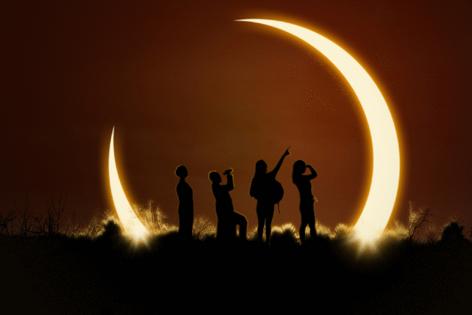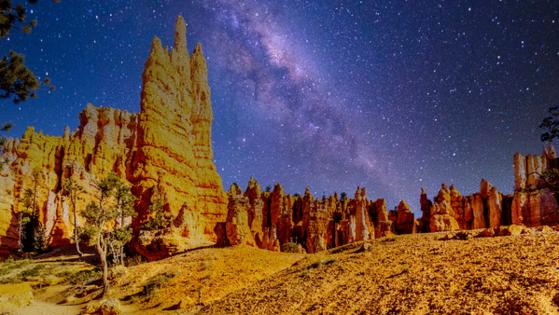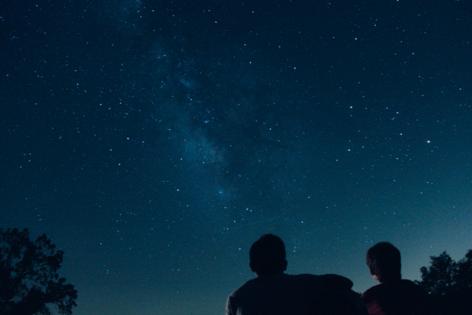Celestial Phenomena and a Total Solar Eclipse Still Thrill Earthlings
By Victor Block
People in ancient China believed that an eclipse occurred because a dragon ate the sun. For the Tewa Pueblo Native Americans, who resided in present-day New Mexico when early Spanish conquistadors arrived there, an eclipse meant that the sun temporarily left the sky to visit its home in the underworld.
While scientists today offer another explanation for what occurs when the moon completely covers the face of the nearest star to Earth, the phenomenon continues to interest and intrigue people. That will be true when the moon moves between the Earth and sun on April 8 this year. A shadow will cross our planet's surface, and people located in this band will experience the total solar eclipse as day is temporarily turned into night.
At that time, normally hard-to-see planets and stars will become visible, the air temperature will drop and, if past is prologue, some creatures -- from tiny insects to bulky bovines -- will behave in unusual ways.
Explanations for the existence of other phenomena in outer space also have evolved from fantasy to fact. The Babylonians believed the sky was a dome and the sun, moon and stars danced across its ceiling. The ancient Egyptians believed the universe was a box and that the sun and moon gods sailed along a river that flowed around its inner walls. In early Greek cosmology, the world was a disk surrounded by a river.
As we wait to observe the eclipse of the sun, it's possible to enjoy the beauty and wonder of the stars and other celestial objects that fill the skies every night. In order to see them at their best, it's necessary to find a place where city lights and other sources of brightness are absent or at least minimal. Perhaps you're lucky enough to live in such an environment. If not, there may be one not far away or to which you can travel throughout the country.
Despite the fact that the East Coast is dotted by light-emitting urban areas, some oases of darkness welcome stargazers. Cherry Springs State Park in Pennsylvania has been designated an International Dark Sky Spot by the International Dark Sky Association. This label recognizes places where the darkness of the night sky is relatively free of interference from artificial light.
Cherry Springs sits on a hilltop surrounded by a state forest, providing a 360-degree, pollution-free view of the night sky. From that lofty perch, it's possible to see the Milky Way and as many as 30,000 stars.
Mountain Lake Lodge enjoys peaceful solitude in the New River Valley of the Appalachian Mountains in southwest Virginia. During the new moon, when the sun and moon are aligned on opposite sides of Earth, nights are dark and planets, stars and other objects in the sky become more visible. At those times, the resort offers shuttle service to transport guests to a high elevation where they can stargaze through telescopes. Other perks include lawn blankets, a marshmallow roast, moon pies and a galaxy-themed beverage.
Branson, Missouri, is known for its varied selection of theme parks, exhibitions and entertainment venues that entertain people of all ages. Those in the know are also aware that it offers inviting stargazing opportunities. One place popular with people who come here to spend time by the water is Table Rock Lake, a human-made reservoir that has more shoreline than the entire state of California. Another is the Showboat Branson Belle, a classic riverboat that combines dinner, entertainment and a spacious deck for observing the sky.
More favorable sites for seeing stars are located a short drive from town. The open glades and ridgetops in the Mark Twain National Forest are good places to enjoy a dark sky adventure.
Clear, dry air, high elevation and lack of light pollution make Bryce Canyon National Park in Utah one of the darkest locations in North America. At times the Milky Way resembles a giant silvery rainbow across the horizon, and thousands of stars are visible with the naked eye.
Outstanding stargazing also awaits visitors to Glacier National Park in Montana. Its pristine wilderness, distance from major cities and two high-elevation sub-ranges of the Rocky Mountains combine to offer ideal conditions. Adding to the appeal of this designated Dark Sky Park is the St. Mary Observatory, which houses powerful telescopes that provide high-resolution views of planets, galaxies and other heavenly bodies.
In 1977, scenes for the movie "Star Wars" were filmed at locations in Death Valley, California, which doubled as "a galaxy far, far away." Most of the 3.4-million-acre national park there is a dark-sky wilderness area, which has earned the highest (Gold Tier) rating by the International Dark-Sky Association. Some celestial objects that can be viewed there are not visible from anywhere else in the world.
While astronomers have debunked the ancient Egyptian belief that the universe is a box, many people continue to be awed by its beauty. Places to enjoy that splendor are located around the country, and they will be augmented in April by a total eclipse of the sun.
----
WHEN YOU GO
www.dcnr.pa.gov/stateparks
www.mtnlakelodge.com
www.explorebranson.com
www.nps.gov/brca
www.nps.gov/glac
www.nps/gov/deva.
========
Victor Block is a freelance writer. To read features by other Creators Syndicate writers and cartoonists, visit the Creators Syndicate website at www.creators.com.
Copyright 2024 Creators Syndicate, Inc.












